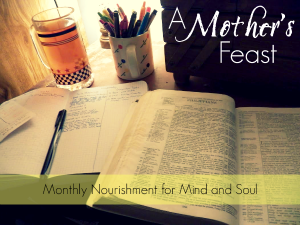My daughter and I have been reading through Ourselves by Charlotte Mason, and this week’s chapter was about the “Daemons (Demons) of the Intellect”: Inertia and Habit. The latter “demon” may seem a bit surprising, since Miss Mason elsewhere promotes “the discipline of habit” as one of the tools we should employ in the education of our children. But here she is concerned that we are not enslaved by habit to restrict ourselves to one area of knowledge and lose interest in anything else. She cites the negative example of Charles Darwin, for whom science became the all-important thing, to the detriment of art, poetry and the things of God. Then she tells of Leonardo da Vinci, one of those great “Renaissance men”, who excelled in many areas of knowledge and skills. She writes in the last section of the chapter, entitled A Magnanimous Mind:
It is a mistake, perhaps, to think that, to do one thing well, we must just do and think about that and nothing else all the time. It is our business to know all we can and to spend a part of our lives in increasing our knowledge of Nature and Art, of Literature and Man, of the Past and the Present. That is one way in which we become greater persons, and the more a person is, the better he will do whatever piece of special work falls to his share. Let us have, like Leonardo, a spirit ‘invariably royal and magnanimous.’
In my own efforts toward self-education, my tendency has been to spend my time on what comes more naturally and ignore my weak areas. My INFP personality is easily drawn into the realms of history and literature, and my understanding of myself is enriched by them. I usually have a “Christian living” or theology book going, as well as regular Bible reading. Thanks to my parents and piano teacher, I have a love for classical music, and I am learning about artists and their works alongside my kids. But science and especially math are another matter. According to what I’ve read, thinking is an INFP’s weakest mode of relating to the world, and science and math require a good deal of thinking! Just looking through a math book makes my eyes glaze over, and yet I know that God is the originator of math, as well as of words, and that math has a beauty of its own that I do not understand. So perhaps I need to delve into that copy of Euclid’s Elements, asking hubby for help when I get stuck, and take another step towards developing a magnanimous mind.
Linking up with A Mother’s Feast at StrongHaven







This is awesome. At convention, Andrew Kern suggested 15 minutes of math and Latin each day.
Thanks, Dawn. 15 minutes seems doable, just have to make it a habit. 😉
As someone who struggled with math in school I'd recommend reading Nicomachus of Gerasa's Introduction to Arithmetic. It's beautiful, and I imagine it's best to have a good foundation in classical arithmetic before moving on to Euclid. (Classical arithmetic isn't at all the same thing as elementary school arithmetic — that's what the Greeks would have called Logistics, but working through Nicomachus will strengthen your computational skills too.)
You had me at "beautiful"! 😀 Off to check it out…